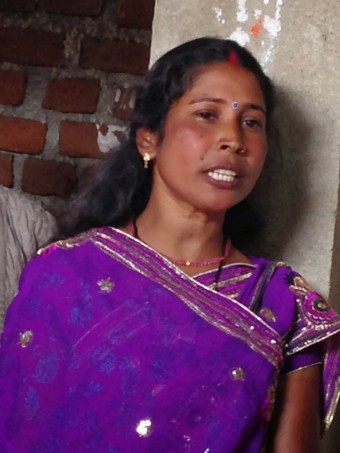
Visiting Matrichaya
By Tina Romenesko
During the afternoon, we headed to the Munda tribal village on the outskirts of Ranchi. The projects in this village are overseen by Matrichaya graduate, Bacchan Devi. Bacchan is a shining example of the ever widening circle of women. When she heard about Matrichaya, she thought because she was uneducated, she wouldn’t qualify.
With Mama’s encouragement, Bacchan applied for the program, was accepted, and learned to sew, knit, and embroider. Eventually she became a leader herself, and opened a successful sewing center in the village marketplace. However, the men didn’t like that the women were meeting together in a public place – so she moved the group to her home and turned the upper level into the sewing cooperative.
The steep concrete staircase opens into a large common space where 25 women are waiting anxiously for us to arrive so they can show us their workbooks and passbooks. Each woman has her own 3 ring binder with doll size versions of the kurtas, pants, dresses, and tops they will be sewing to sell in the village. Each woman also has her own passbook – which allows them to buy supplies and even a sewing machine – on credit. For each finished piece they receive 188 rupees, which is about $3.00. The training is free and runs on ongoing grant support from DFW. Originally, they were shooting for 20 trainees, but the demand was so great, they now have 40 women enrolled in the training. Matrichaya believes the village can sustain even more seamstresses,
As Bacchan poses for a photo with her son and husband, Taryn asks him how her husband feels about his wife and the way she has helped her community. In broken English, he replies, “ I support her, and she supports me!” We all clap – but Archana tells us at dinner, that wasn’t always the story. The empowerment of women is a breaking of tradition – a necessary change and also a challenging one. Without the support of Matrichaya, Bacchan wouldn’t have had the courage to continue, and challenge traditional family structure. Seeing the pride in her husband’s face now, empowers the whole community, that together they can all grow and prosper from these trainings.
Bacchan is also the medical liaison for the village and has created a health center and preschool in a very humble building on the other side of the village. The women in these trainings are educated about vaccinations, basic hygiene, nutrition, and are instructed how to treat minor illnesses. They also serve as birth attendants or doolas. The children in the preschool receive one free meal daily of lentils and rice, that is government subsidized. For some it is the only meal of the day. The children are very shy and a few start to cry when they see us.
Dining For Women has supported over 6500 trainees at Matrichaya since 2005, and the key are these self help groups that promote socio-economic change through education. Archana calls it a “hand up”, not a hand-out. Some of the other trainings include mushroom cultivation, jewelry making, and beauty school training. From legal aid to health advocacy, the focus is on Health, Occupational Preparedness, and Education or H-O-P-E. HOPE.
Our last Matrichaya stop is quite a drive out of town to visit a bamboo artisan project training in a small village. The women here are using rustic saws and awls to make wall hangings, baskets, and vases out of bamboo. I crouch down on the ground and hold a thick stalk of bamboo for a woman that has been sawing since we arrived on a large, green bamboo stem. As I hold it for her, we smile. I talk to her kids in my funny language, with my blue eyes, and none of them cry this time – they smile, because their mom’s are smiling too. I give the project manager 60 rupees for a bamboo vase that will sit proudly in my kitchen – a reminder of the hard work these women do and have done to improve their lives and the lives of their families.
Thursday is our last day in India. We are back in Kolkata now, and have been invited over to Ayesha’s and Sadek’s for breakfast. As we sit on the floor and share fresh fruit and pyes (a wonderful porridge of rice, milk, cashews, and sweet) , they show us their books of published poetry, written in Bengali and adorned with Sadek’s paintings. We view the photos from the Santali village visit and are all struck in that moment by the uniqueness of each project we have visited. What makes the difference is passion, and being able to channel that passion into progress – and get funding. With Matrichaya, we see how a family matriarch has made a difference for children living in urban slums and tribal villages. Her passion has inspired her daughters, and a whole community to expand the work she began after her husband’s untimely death. Ayesha and Sadek are shining examples of the disadvantaged working against tremendous odds to help the disadvantaged. And Colleen and Anchal have extended the circle of support to corporate America, striking a design deal with Urban Outfitters, and offering commercial sex workers an alternative lifestyle with a viable market, to raise the status of their children and offer these young women hope and empowerment.

